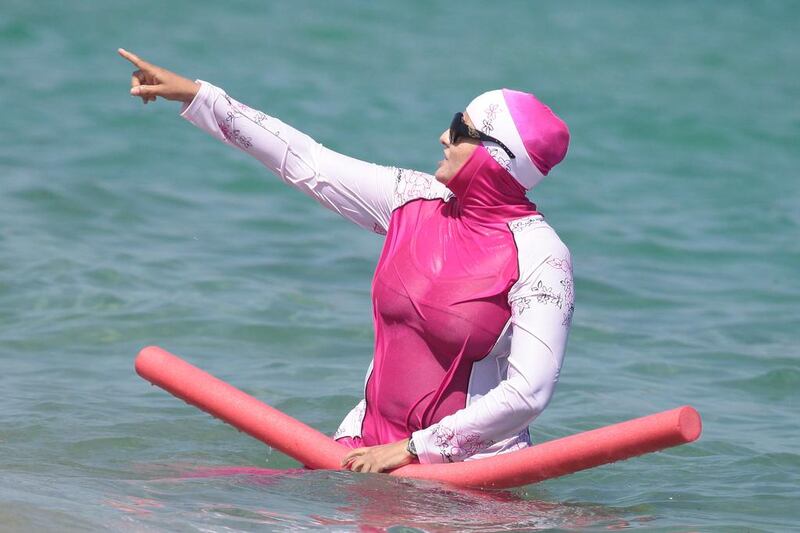Imagine you are sitting on the beach with your child. Under the beating hot sun, you build sandcastles together. In the sea, perhaps you watch surfers in their wetsuits riding the waves. Further along, it’s possible some people are wearing bodysuits or kaftans to protect their skin from the searing sunshine, topped off with a hat.
You look up and four policemen are surrounding you. They have guns. They tell you to remove your top. Behind them, some of the beachgoers are cheering the policemen on, some adding cries of “Go home!”
This was the scene in Cannes earlier this week as the ban instituted across several French towns on the all-over body swimsuit has been taking hold.
You really need to take a moment to let it sink in, that armed policemen forced a woman to take her clothes off.
If that wasn’t enough to scramble our brains, here’s the irony. These women are being asked to disrobe in the name of liberty.
Other political entities that tell women what they can and can’t wear at the barrel of a gun include ISIL.
A burqini – despite its emotive name and connotations of a burqa – is simply a long top with leggings and a swimming cap. It looks exactly like a wetsuit. So clearly this is not about the form of the clothing but the meaning ascribed to it.
If a woman who was not Muslim wore one would she be forced to disrobe? If yes, then women should be absolutely clear that this really is an attack on all women. If not, then it is clear that this is not about coverage, but is a direct racist attack on Muslim women, deliberately criminalising them simply for being in the public space. Which is yet another irony given the great claim that Muslim women must integrate themselves into the public domain. And it’s a further irony that these women are portrayed as oppressed victims at the same time as criminals and transgressors against the state.
This has to become a turning point in the culture and identity wars. If the outcome of that project is that a woman is forced to undress in public by armed police then it is clear that the challenges have been wrongly defined and the strategies are misguided at best – racist, misogynistic and dangerous at worst.
People should now confront the brutal reality of the gendered hatred that faces Muslim women. This is the direct result of the failure of imagination by French politicians to create an identity that can unite its citizens in a globalised, pluralistic 21st century. By defining “Frenchness” only in opposition to Muslim women – and a stereotyped, fearful definition of them – the state has shown that it has yet to create a genuinely pluralistic vision of society.
When the state decides to police what women can and cannot wear, humiliate them and contravene their human dignity, then there should be no doubt that all women are at risk.
Yet, bar a few lone voices, the global sisterhood has been woefully quiet. Instead of the solidarity that should be shown when women’s rights are contravened,women have been cheering on the state in its persecution. The horrific incidents that have resulted should be a wake-up call: this is an attack on all French women.
Shelina Zahra Janmohamed is the author of Love in a Headscarf





